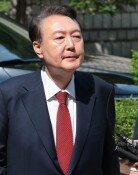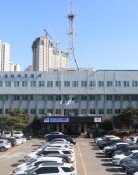Public Companies Must Hire Science and Technology Workers
Public Companies Must Hire Science and Technology Workers
Posted January. 26, 2004 22:49,
From the second half of this year, public companies will be obliged to recruit a certain number of science and technology workers.
In addition, the government plans to introduce a national special researcher system which targets the Nobel Prize, and to establish five specialized courses in major graduate schools of science and technology that are related to next-generation growth engines.
Ministers of Science and Technology (MOST), Oh Myung, Commerce, Industry and Energy (MOCIE), Lee Hee-bum, and Information and Communication (MOIC), Chin Dae-jae, met with the chairman of the Federation of Korean Industries (FKI), Kang Shin-ho, and four economic organizations on January 26 at the Korea Press Center in downtown Seoul and held a forum on the civil governments joint policy for promoting technology reform in economic areas.
In the session, the ministries of Science and Technology (MOST), Commerce, Industry and Energy (MOCIE) and Information and Communication (MOIC) announced their decision through a press release that they will establish a fixed quota system for recruiting science and technology majors. As an urgent solution to boost human resources in science and technology area, this system targets 11 government-led institutions and 14 government-financed groups that are scheduled to hire new employees in the second half of 2004.
After examining the demands of new employees from these 25 companies in the first six months, the government will determine the concrete size of recruitment.
Moreover, a national special researcher system will be introduced in order to grant experts in basic science, with doctorates or higher-level degrees, research funds of more than 100 million a year and encourage them to become world class authorities in their related study areas.
As a short-term measure regarding science and technology workers, the MOST plans to lend its support with a total of 6.5 billion won, of which 22 million won per person will be provided to small and medium-sized enterprises for the year that they hire researchers with masters degrees, and 28 million won per doctorate degree for three years. The total number of recipients will come to 270.
In addition, 5,000 graduate students majoring in science and technology will be selected separately and granted full scholarships.
After obtaining a doctorate, governmental support will be extended to overseas training (400 people) and the granting of foreign post-graduate degrees (600).
The MOCIE has set aside 10 billion won in its budget and will offer 600,000 won per person for six months to the MSEs that hire the unemployed graduates majoring in science and technology (up to 3000).
In particular, the MOCIE will create five special courses, such as intelligent-vehicle, systems on chip (SoC) displays, intelligent robots and biology at distinguished graduate schools as early as next year, with 10 billion won of sponsorship funds.
The MOST also plans to enact a so-called research and development performance evaluation law and operate a ministerial backup team that will assist in the performance of research and practical adaptations within the year. Included in this law is an introduction of a research manager certificate and a development plan for the research and development service industry.
Ki-Jeong Ko koh@donga.com




![삼겹살 식당에서 소주 ‘짠’… 한국 아니라 필리핀이라고?[동아리]](https://dimg.donga.com/c/138/175/90/1/wps/NEWS/IMAGE/2025/05/26/131685388.2.jpg)


